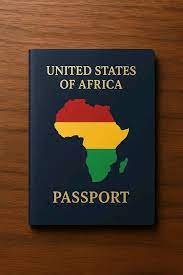The Vision, the Probability, and the Transformative Potential of a Borderless Africa
Imagine boarding a flight from Lagos to Nairobi, or taking a road trip from Dakar to Johannesburg — without endless visa forms or being held up at multiple borders. One passport. One identity. One Africa.
That’s the dream behind the African Union (AU) Passport — a bold vision of a continent where borders matter less, and unity matters more.
While the AU passport remains largely symbolic today, the idea sparks an exciting question: If all of Africa had one passport, what would life actually look like?
Probability and Possibilities for Africa
In 2016, the African Union unveiled the concept of a single African passport, part of its long-term Agenda 2063 plan. It aimed to remove restrictive visa barriers and unlock economic, cultural, and social exchange across 55 member states.
Nearly a decade later, however, the passport remains mostly limited to AU officials, heads of state, and diplomats. This raises a crucial question:
What is the probability of the AU passport becoming a reality — and what would it mean if it does?
The Probability: Hopes vs. Hurdles
Political Will
- Only a handful of African countries (Rwanda, Seychelles, Benin) offer near-visa-free entry to other Africans.
- Many governments remain cautious, citing concerns about migration control, terrorism, and national sovereignty.
Legislative & Bureaucratic Hurdles
- For the AU passport to work, national laws must recognize it as a valid travel document.
- Only a fraction of countries have signed or ratified the Protocol on Free Movement of Persons, which legally anchors the passport.
Infrastructure & Technology
- Effective rollout requires secure biometric systems to prevent forgery and fraud.
- While some nations are ready, others lack the infrastructure for harmonized border control and identification.
Regional Experiments
In 2025, Mali, Burkina Faso, and Niger launched the AES biometric passport, offering free movement across the Sahel region. Such regional initiatives may pave the way for continent-wide adoption in phases.
Probability Outlook
A fully functional AU passport by 2030 is unlikely. A phased, regional approach aligned with Agenda 2063 is more realistic. Regional blocs will likely lead the way, with continental adoption emerging gradually over decades.
What One Passport Could Mean for Africa
1. Economic Growth & Trade
- Easier movement of entrepreneurs, goods, and services would boost AfCFTA implementation.
- Reduced trade barriers could increase intra-African commerce and global bargaining power.
2. Tourism & Cultural Exchange
- Citizens could explore the continent visa-free, promoting tourism and pan-African identity.
- Cross-border travel could reduce xenophobia and foster shared cultural understanding.
3. Labor Mobility & Opportunities
- Skilled workers could move to where opportunities exist, balancing labor markets and filling talent gaps between countries.
4. Education & Research
- Academic mobility would surge, allowing students, researchers, and universities to collaborate freely across borders.
5. Challenges to Address
- Security Risks: Open borders may heighten terrorism or trafficking concerns.
- Brain Drain: Wealthier nations could attract talent from poorer states.
- Implementation Costs: Standardizing biometric passports and secure systems will be expensive.
Conclusion: A Marathon, Not a Sprint
The AU passport remains a promise, not a present reality. The short-term probability is low, but regional progress signals steady movement toward free mobility.
If implemented successfully, the AU passport could become one of the most transformative symbols of African unity in the 21st century — reshaping economies, identities, and how Africans experience their continent.
For now, the journey is less a sprint and more a strategic marathon requiring political will, infrastructure, and trust.
If you enjoyed this article, explore more insightful stories on iNaijanow and join the conversation on our Instagram, Facebook, X, YouTube for fun, engaging, and up-to-date content.
- Fuji Vibrations 2025 by FUJI: A Opera Sets a New Benchmark for Celebrating Fuji Heritage and Community

- Wizkid Breaks 2025 Billboard Afrobeats Record with 21 Entries

- AFRIMA, British High Commission Strengthen Creative Collaboration

Disclaimer: The opinions, views, and information expressed in this article are those of the author and do not necessarily reflect the official policy, position, or views of iNaijanow. The company assumes no liability for any errors, omissions, or damages arising from the use of this information.













